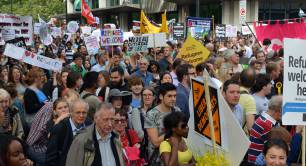Global social innovation round-up #34
UK social investment sector accused of having a gender blind spot
The Young Foundation has published a report urging the UK government and wider social investment sector to increase their use of gender lens investing – i.e. using capital to generate financial return and advance gender equality simultaneously. It concludes that although the UK is a global leader in social investment, it is losing out on investment opportunities and in some cases having a negative impact by not harnessing the potential that impact investing with a gender lens offers.
CEO of The Young Foundation, Baroness Glenys Thornton, said: “Despite pioneering the field of social investment and sitting at the heart of what is now a multi-million pound social market the UK is hardly off the starting blocks when it comes to harnessing finance to tackle gender inequality.
We know that gender equality is central to achieving a strong economy
The Sky’s the Limit report sets out evidence from a range of sources including the United Nations and McKinsey, which shows that investments that empower women and girls and/or take on gender considerations more broadly, are delivering increased or more secure financial returns.
Big Society Capital’s CEO Cliff Prior said: “We know that gender equality is central to achieving a strong economy and a healthy, happy society. With social investment still a relatively new field we have an important window of opportunity in which to integrate a gender lens. It’s one we should seize as both the right and also the most effective thing to do.”
Call for evidence on mission-led business opened in UK
The Cabinet Office is calling for evidence on how mission-led businesses can be supported over the next decade. It has defined this type of enterprise as a business that ‘can fully distribute its profits; identifies an intention to have a positive social impact as a central purpose of its business; makes a long-term or binding commitment to deliver on that intention through its business and operations; and reports on its social impact to its stakeholders’. Crucially these types of businesses do not have an asset lock in place protecting the social mission of the business in the same way that community interest companies for example do.
Minister for civil society Rob Wilson said: “I welcome as much input as possible into this review to make sure that we get this right. I want every entrepreneur to be able to easily establish a business that commits them to making social as well as an economic impact on society if they chose too.”
A panel of nine experts, including Antony Ross, partner at Bridges Ventures and Monique Villa, CEO of the Thomson Reuters Foundation, has also been appointed to advise the government on how to grow the mission-led business sector in the UK.
The call for evidence is open to everyone and seeks views on ‘why businesses might choose to become mission-led, how these businesses will grow over time, the challengese they might face and how these could be addressed’. It closes on 8 July. To have your say, click here.
Students say no to fossil fuel investment in the US
California’s prestigious Stanford University has announced it will not divest from the fossil fuel industry – specifically from oil or gas – despite a call from students to do so. The Board of Trustees’ decision came in response to a request for divestment from Fossil Free Stanford (FFS), a student led campaign group whose activities over a number of years have included a week long sit in protest outside the institute’s president’s office.
In a public statement from the university’s trustees, it reads: “With respect to investments, as background, Stanford’s endowment exists to support the university and its students in perpetuity… To meet these needs, the endowment invests broadly in economic activity around the world. Divestment is rare, and consideration of it is reserved for specific cases in which, among other things, the demonstrated social injury by a company substantially outweighs any social benefits it provides.”
It concludes: “We believe the long-term solution is for all of us to reduce our consumption of fossil fuel resources and develop effective alternatives. Because achieving these goals will take time, and given how integral oil and gas are to the global economy, the trustees do not believe that a credible case can be made for divesting from the fossil fuel industry until there are competitive and readily available alternatives.” According to the Stanford Daily, members of the FFS have vowed “to continue to fight for their cause”.
 Student protest. Photo credit: Fossil Free Stanford
Student protest. Photo credit: Fossil Free Stanford
From New York City to Hyderabad social enterprises support each other
Kheyti – a social enterprise based in Hyderabad, India set up to support smallholder farmers – has won the CommonBond Social Impact Award and with it $10,000. CommonBond is also a social enterprise, which was set up in New York, USA to help students and graduates get and refinance more affordable loans.
Kheyti was founded one year ago and sells greenhouses to farmers that own up to two hectares of land. The greenhouses provide the farmers with the means to control temperature, humidity and pests, ensuring they have consistently good crop yields. For many smallholder farmers in India weather conditions can be detrimental to annual crop yields and thus their livlihoods. The greenhouses are sold to the farmers on affordable payment plans.
The founders of the social enterprise estimate that farmers will be able to make around $100 a month in income using the greenhouses, in comparison to $100 a year using traditional farming methods. The greenhouses also use considerably less water.
London’s new mayor celebrates social enterprise style
Sadiq Khan’s first week as London mayor following the city’s election last Thursday has seen him trade blows with US presidential hopeful Donald Trump, deal with the aftermath of what turned out to be false allegations of associations with extremist groups and introduce popular changes to bus fares. He did also manage to find time to celebrate his mayoral campaign – and did so at the social enterprise restaurant Brigade Bar & Bistro in London Bridge.
Brigade opened its doors in 2011 and has since helped vulnerable people sleeping rough and living in hostels develop their skills through training courses and enter into formal employment. Many of the individuals Brigade works with are ex-offenders or have substance abuse issues. The team at Brigade last week tweeted: “We had some very special guests last night @SadiqKhan @jeremycorbyn thanks for celebrating with us. #LondonMayor2016”
Header image: Jude Winter from community transport provide HCT Group with Baroness Glenys Thornton
Photo credit: Matthew Herring



